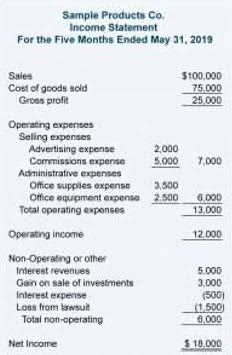
Additionally, when you outsource bookkeeping, you lose the ability to walk over to your bookkeeper’s desk and ask them a quick question. However, provided your outsourced bookkeeping partner embraces cloud-based accounting software, you’ll have access to your books 24/7. Without strong bookkeeping, it’s impossible for business owners to understand the financial position of their business, forecast budgets, or understand their cash position. They bring a healthy skepticism that encourages business owners to take a more intelligent, nuanced approach toward decision-making. When a business outsources its accounting, it essentially transfers responsibility for some or all of its accounting tasks to a third-party accounting firm. In addition to the above services, our team will work closely with you to fully support your account.
- If you need help with CFO-level strategic initiatives but have the resources to handle bookkeeping in-house, a good provider will have no hesitation in working with you.
- Outsourcing some or all of your accounting needs to an external third party can represent a major win for business owners.
- We’ll share the types of tasks that can be outsourced and highlight the key issues business owners need to consider when assessing outsourcing accounting providers.
- Outsourced accounting also helps ensure business continuity and reduces the risk of knowledge loss.
- For example, if you are unable to hire a full internal accounting team, your outsourced provider can assume those responsibilities to save your company time and money.
- “Cherry Bekaert” is the brand name under which Cherry Bekaert LLP and Cherry Bekaert Advisory LLC provide professional services.
- Outsourced accounting teams can be scaled to fit your organization’s specific needs, which makes it great for small businesses that are growing or can’t hire internal accounting staff.
When taking a look at your team members’ responsibilities, you probably know that a majority of their job involves spending copious amount of time on low-impact tasks. And although those tasks are necessary (like closing the books), they also take away the focus from furthering the growth of your company. In fact, research shows that the more disengaged an employee is, the less productive they become.
Establish a service-level agreement
As mentioned, one alternative to outsourcing is hiring a full-time employee or assembling an accounting team to handle accounting functions. But this is often a huge expense for smaller businesses and difficult to scale as businesses grow. This is why many companies look into DIY accounting systems such as QuickBooks or Xero. An outsourced accounting service provides owners of accounting and bookkeeping firms with an offshore extension of their team. Nick and his team at TOA Global work with more than 1,000 international firms and over 3,700 specialist accountants and support team members. Prioritize critical tasks essential to your firm’s long-term success while your outsourced accounting team manages routine tasks.

You have done them yourself because it’s in your best interest to maintain accounting and bookkeeping. With proactivity of an outsourced team DOES come a caveat – you can’t walk down the hall to ask about every single financial event that takes place. Of course, you’ll be able to call your account manager, get weekly updates and receive monthly reports, but it requires trust in your outsourced relationship. With any paid service, scope creep can happen where one task ends up snowballing into multiple, and it can result in additional costs you weren’t initially aware of (or forgot about). Be sure to make your month-to-month relationship clear, and expectations set at the beginning so it minimizes the chance of this happening.
Data security concerns
Whether you’re filing solo or working with a CPA, we’ll do the books and work directly with a tax filing pro to get your taxes filed accurately and anxiety-free. At some point, you may find it more beneficial to move some or all of your accounting processes in-house. But the majority of companies just want to meet their obligations with minimal fuss, and entrust the heavy lifting to trained experts. If you’re communicating clearly with a trustworthy partner, this doesn’t need to be a negative. The obvious downside to outsourcing is that you cede control over the process. However, this can be mitigated significantly by choosing the right accounting partner and building a positive relationship.
- Therefore, your decision will require some budgeting on your end to see what you can afford—whether it be an accounting partner or an alternative.
- Many companies outsource this task to experienced auditors, who can independently assess your company’s financial processes and even advise on ways to improve.
- Before you can start thinking about how outsourced accounting might benefit your business, it’s crucial to understand exactly what outsourced accounting is (and isn’t).
- Tushar is an Offshoring Strategic Advisor for Accounting Firms with 21 years of experience in Business Development, Customer Success, and Client servicing.
- An account manager and client experience manager are the firm owner’s partners every step of the way.
- Having outside support can also provide immense peace of mind against internal fraud risk.
They have a wide range of responsibilities, from managing bookkeeping staff to working on more strategic initiatives. But as your business grows and your financial needs evolve, it’s common to find that your initial approach to bookkeeping is no longer delivering the results you need. If that sounds familiar, you might want to consider outsourced bookkeeping. You may think that outsourcing is only a practice for large, well-established businesses that offshore basic operations.
Which types of outsourced accounting services are available?
By comparison, outsourced accounting services typically cost a fraction of these rates and deliver better results. Among all the benefits of outsourced accounting, the most attractive advantage is that it can give your internal team more time to focus on other matters. For example, if you are unable to hire a full internal accounting team, your outsourced provider can assume those responsibilities to save your company time and money.
Let’s take a look at some common outsourced accounting myths and explore how outsourced accounting service providers like our team at LBMC are addressing them to build a better client experience. Outsourced accounting firms work with a wide range of clients, many of which may also operate in your industry. Their teams live and breathe accounting every day, and will replicate best accounting practices from across your industry into your business’s workflows, boosting efficiency and productivity. For businesses that may need to meet financial compliance, or that are struggling to hire a capable in-house accountant, outsourcing provides a practical solution. Outsourced accounting can benefit a wide range of business types and sizes, from small startups to mid-size companies.
You should also specify what happens if the provider fails to meet any of these expectations. This could be anything from a partial refund for a late delivery, to termination of the contract in more extreme cases. Once the outsourced accountant you’ve established what you want to outsource, the next next step is to identify who you’re going to outsource it to. If you’d like to outsource some or all of your accounting obligations, here’s how to get started.

As you grow, having a professional, outsourced accountant on your side gives you the advantage of proactivity rather than reactivity. Trained accountants can spot red flags ahead of time and notify you about things like cash flow discrepancies. By outsourcing your accounting and bookkeeping tasks, you now have the chance to think about upgrading and improving systems in your firm, so your in-house work is completed with greater efficiency. This can include implementing new software, identifying bottlenecks and making changes so your business is more proactive than reactive.






